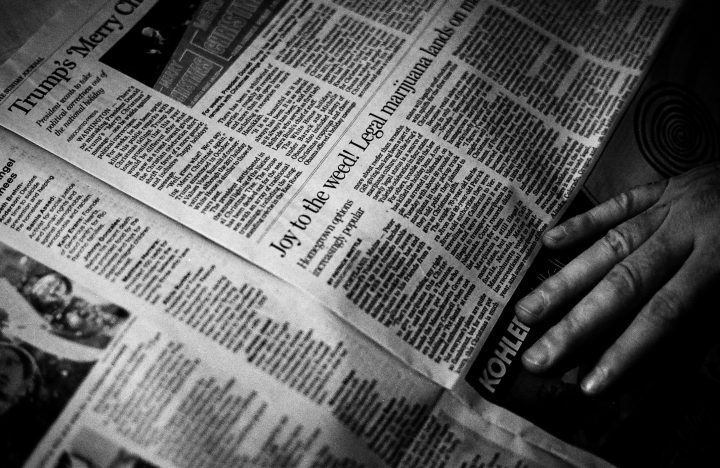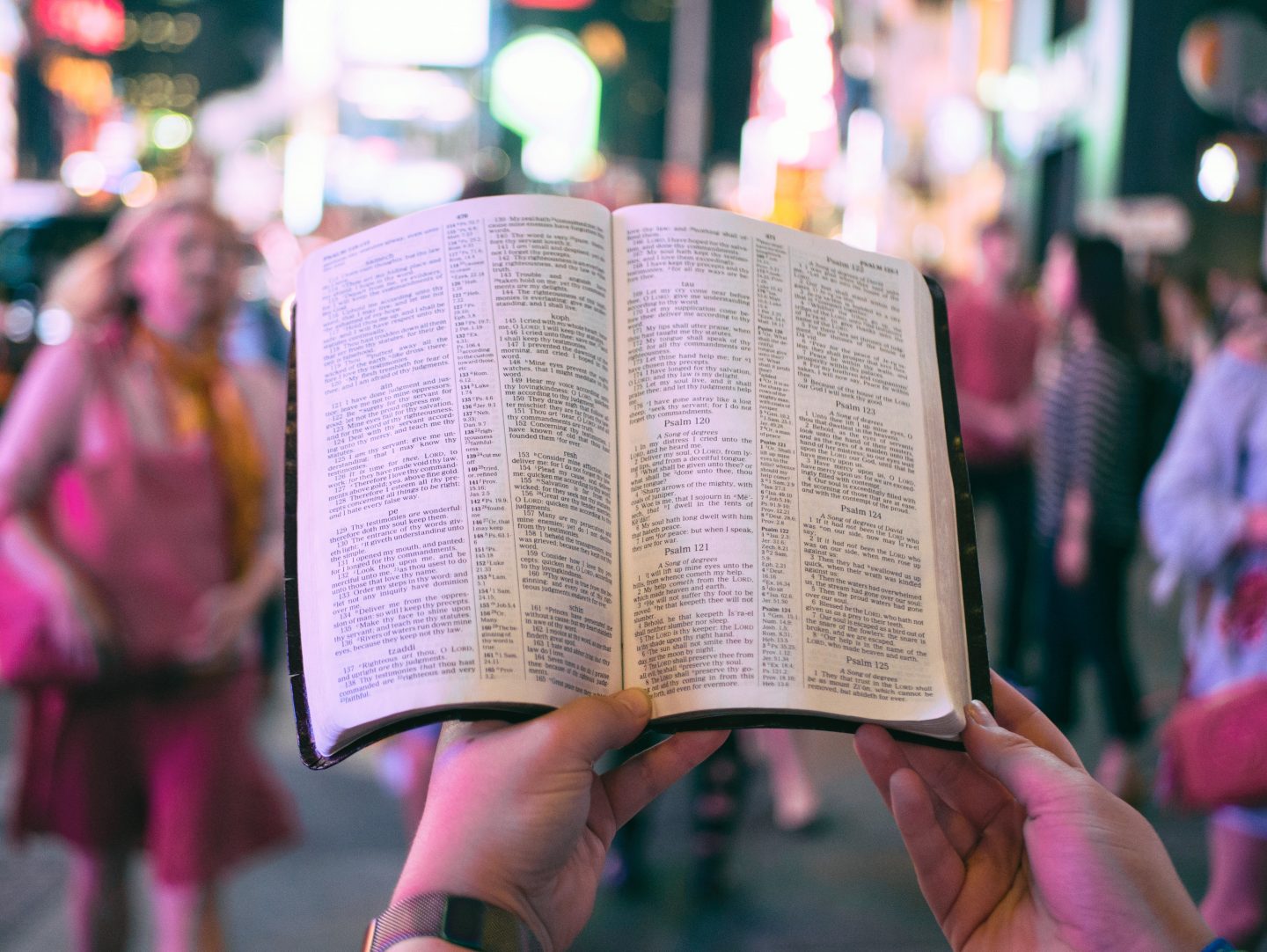- I can’t handle any more bad news
- When I am at the epicentre of bad news
- Suffering makes me angry
- My default skepticism surfaces questions
- My failed expectations
- What do I do with my God hate?
- A paradigm shifting question
- Jesus had the right to resent God most
- Jesus suffers my hell
- How did Jesus persevere through his hellish affliction?
- My suffering swallowed up in resurrection hope
- Suffering well?
- Where else can I go, Jesus has the words of life
I can’t handle any more bad news
Do you ever feel overwhelmed by the sheer volume of bad news you read, watch, or listen to every day? For myself, I find that there is no shortage of it to be found, and my preoccupation with bad news can often drown out my ability to hear any good news that may exist, making it seem like there is none. Violence, injustice, disease, natural disasters, racial and socio-economic division, absurd politics — it just never ends.
Recently, an Amber Alert was sent out in Ontario to everyone’s phones, only for the result to be the tragic death of an eleven-year-old girl, allegedly at the hands of her father. The news makes my stomach turn.
If I let it (and even sometimes when I don’t), bad news from around the world can stream through all my digital devices non-stop, overwhelm my senses, and flood my consciousness. My soul can easily be pulled down into despair, my hopes for a better world drown in a seemingly endless torrent of tragedy, injustice, and suffering.
Adding insult to injury, when I rely on social media to make sense of the bad news I take in, I am overwhelmed by controversy. I can be sucked into and immersed in a seemingly endless cesspool of social commentary, a mass of muttering judgements and opinions, boiling out of conflicting and disgruntled human hearts.
I am shocked and disturbed by the degrading and inhumane ways that we relate to one another on social media platforms: spouting opinions aggressively, trash talking, arguing, blaming, demonizing, hating on, dehumanizing, and taking sides.
Too much exposure to bad news and its resulting social commentary gets me into a bad state, making me confused, stressed, angry, and depressed. I can sometimes be so disturbed that I feel physically ill. I sometimes want to give up, curl up, and die. I have learned my need to limit my exposure. The more I am bombarded with bad news and controversy, the more I feel something disturbing inside of me. Spiritually. Emotionally. Physically.
Dark emotions of fear, helplessness, despair, cynicism, and resentment can subtly invade, undermine, occupy, and overpower my Biblically formed persuasion that God is all-powerful, good, and caring. Doesn’t it appear that evil, suffering, and death in this world rule supreme?
Although I say I believe God exists, I often find myself living like he doesn’t. Instead, being immersed in a world filled with bad news, I function more like life is a survival of the fittest. I get worried, panicked, obsessed, and worn out, anxiously wondering how I will provide for and protect myself and those I care about in a unpredictable, chaotic world gone wrong.

When I am at the epicentre of bad news
And it unfortunately doesn’t stop there. Not only am I regularly confronted with the suffering of the world around me, but I am constantly faced with the reality of my own daily suffering. This only serves to compound my doubt in God’s power, goodness, and care.
All my life I’ve struggled with low energy levels. With advances in diagnosis I now understand more fully my condition of debilitating chronic fatigue. For me, this includes ongoing chronic body pain from past injuries and surgeries.
Night after night I struggle with insomnia, only to feel tired and wired. I stress out easily, feeling like my audio visual senses are easily over stimulated. It limits my capacity for everything. I bemoan my failing mental health. Social anxiety has prevented me from enjoying community more fully.
I am tormented by grievous depression, stemming from guilt and shame of my selfishness and failures in my past. I am anxious about being enough for the demands of life ahead. I fear that I am missing out on life. These thieves have robbed me of much of my energy and ability to enjoy my life and relationships.
The closer I am to to the epicentre of suffering, the more I am shocked to see how easily I can feel orphaned and abandoned by the all-powerful, good, and caring God I say I believe in. When God doesn’t come through the way I had hoped, I feel disillusioned and let down. I am sad to confess that is when…
…I start to hate God.
Suffering makes me angry
My capacity to listen to bad news, make sense of it, grieve for it, respond to it, and heal from it, is limited. I get overwhelmed and frustrated enough by my own life struggles, and the suffering in my own little community, let alone the endless stream of bad news I can expose myself to through my digital devices.
When I get into this stressed and depressed state of mind, subtle doubts about the goodness of God’s character begin to course through my mind. It’s when these stressors compound and weigh heavy on me that I feel the seductive lure of doubt. My dislike for the prevalence of evil and suffering makes me doubt whether the power behind the universe is all-powerful, good, or even cares at all.
Especially when I am suffering from intense depression, I am tempted to entertain thoughts that the power behind the universe may in fact be blind and impersonal, even cruel, as if willfully causing me to suffer, but then feeling no concern or lacking power to do anything about it.
In my experience, I see a direct correlation between my degree of suffering and the amount of doubtful thoughts I have towards God. The more intense and close I am to suffering, the more prone I am to feel disappointed and resentful towards God. I can find his lack of intervention annoyingly insensitive.
I am disturbed when my repeated cries of desperation, for the same requests, are met with silence. My faith often fails to have the buoyancy or resiliency to overcome massive waves of doubt. I am overwhelmed and held under by the cursed reality I live in, frustration and unbelief thrive, anchored and weighed down by mounting discomfort and pain.
Isn’t this absurd!? I can’t reconcile my belief in an all-powerful, good, and caring God with my experience and hate for evil and suffering.
My default skepticism surfaces questions
I’ve started to pay more attention to my inner self-talk when frustrated with any form of suffering—whether personal experience or exposure to bad news in media. Expressing my thoughts on the writings of C.S. Lewis have unlocked an an angst and grief before unspoken. Here is what my inner dialogue with God can sound like.
“God, if you do exist as all-powerful, good, and caring, why are you seemingly indifferent to evil and suffering? Why don’t you intervene? Why don’t you stop all injustice and heal all pain?
Are you good but lack power?
Are you powerful but don’t care?
Or are you powerful but have evil intent towards us?
When I see or experience the injustice, cruelty, and suffering in this world, these combinations of attributes seem more likely explanations for any being given credit for the creation of the universe. Although none of these combinations of attributes gives me any hope of deliverance out of this mess.
But when you claim to be a God who is all-powerful, good, and caring, why do I feel anger and resentment well up in me? Why do I feel frustrated that you don’t show it decisively by alleviating my pain and suffering immediately and indefinitely? I desperately want what I know of you to be true in my experience. I want to experience your power, goodness, and care.
My ultimate irritant is this. If you are all-powerful, good, and caring, why do you allow evil and suffering to persist, feeling weightier, appearing stronger, even triumphing over and seemingly destroying, trampling, and killing what is good? Why does it appear that the might of evil, suffering, and death on this planet wins?“

My failed expectations
In my suffering I struggle to believe the Bible’s claims about the character of God. I discover that this particular combination of attributes (that God is all-powerful, good, and caring) elicits immediate expectations and assumptions within me about how he should act.
My misconceptions about what the Bible describes can make me angry. For example, I read of many healings in the Bible that Jesus performed. There are multiple accounts of instantaneous healing, so I expect that he should do the same for me. In my experience, however, for years now, I have been debilitated by chronic fatigue, depression, and anxiety without reprieve. I call out to God constantly to heal me decisively and indefinitely. Instead, I continue to suffer. In dark times, I doubt God’s power, goodness, or care towards me.
My social conditioning also influences how I expect God to act. In my individualistic culture, I buy into the notion that I deserve better than my lot, as though I am entitled. Why this expectation within me? I am conditioned by a cultural view that tells me I am entitled to have things go the way I want, if I am a good, conscientious, hard-working person. I deserve it. I buy into a culture that promotes my happiness through having things go my way: my pursuit of my dreams, comfort, pleasure, and ease. I act as if my happiness is ultimate.
Here is the crux of my expectation for physical and emotional healing as I verbalize it to God.
“If you are all-powerful, good, and caring, shouldn’t you demonstrate it? Shouldn’t you always act immediately and decisively to bring about my ideal: healing, comfort, and well being? But no, instead I continue to suffer; your inaction seems incongruent with my expectations, based on who you reveal yourself to be, and what I believe you are capable of.”
I am slowly realizing that my expectations themselves (for the favourable way things should go for me) have a major influence on the way I process the bad that happens to me and those around me. When I expect that everything should go my way, any suffering is a shock and an inconvenience to me. I feel cheated by God. I get angry. I start to hate God.
What do I do with my God hate?
No wonder I get angry at God. Of all the relationships I can feel disappointed in, there is none where I have more expectations and more potential to feel let down than in my relationship with God. When things don’t go well for me, by default, I find myself blaming God. After all, isn’t he most able to relieve my suffering?
Ok. I can now recognize, acknowledge, and confess my anger at God. But what do I do with my anger? Here are three destructive ways I tend to handle my anger at God:
I vent: At times I vent my anger in a rebellious rant or rebellious lifestyle. I snub God. I flaunt my sin, even justifying my sinful pleasures. I ignore him. I do what I know he hates. I try to hurt him, just as I would hurt someone who has let me down. I think, or even mutter ill words, towards him under my breath. I distance myself from God and go at it alone. I retaliate with unbelief. At times I have abandoned belief in God altogether, even telling myself there is no God.
I suppress: Sometimes I suppress my God hate. I try not to think about the disparity and disconnect between what I expect God to do for me and the reality of my suffering. I stuff down my anger and hate for God, avoiding all my disappointments with him.
I medicate: I want to ignore and avoid suffering, so I medicate with distractions. I prioritize and busy myself with the here and now. I live my life as if it’s all about getting as much as I can out of it. I idolize: food, romance and sex, education, career, work, money, shopping, possessions, sport and entertainment, adrenaline seeking experiences, and travel. There is no shortage of ways to medicate. The festering of stuffed anger turned inward isn’t more humble, it only causes a delay in my eventual confrontation with my inward depression.
Venting. suppressing, and medicating are all tempting and destructive ways in which I deal with my God-hate.
A paradigm shifting question
But I have to ask myself, ‘Why do I even have expectations for a better world, free of evil and suffering, in the first place?’ It can’t be an expectation informed by the natural world. My grievances are with the natural world.
This is where I realize that my expectation for a better world comes from outside the physical world. It comes from a knowledge of God himself, and that the paradise he made was lost. Even though I often suppress my knowledge of God, it is his supernatural involvement in the world throughout history that informs my discontent with its current state.
Having this insight, I am learning a better way…albeit slowly. I am learning to take my disillusionment and hate for God to God himself. I am learning to model my desperate prayers of anger after the Psalms. It’s shocking to see that God even allowed these prayers in the Bible. Their presence shows me that God can handle my anger. (Check out Psalm 39 and 88) He knows how hateful, blatant, and candid I can become when I suffer and am desperate. I’m not fooling him by trying to hide it.
It’s shocking to see that God even allowed these prayers in the Bible. Their presence shows me that God can handle my anger.
I am also learning from others who have learned to suffer well. Whether reading about the suffering of Job in the Bible, or Nazi concentration camp survivor Corrie Ten Boom in her book, “The Hiding Place,” I am convicted of my sins of resentment towards God, others, and life in general. I, too, want to say, “The Lord gives, the Lord takes away, blessed be the name of the Lord.” I want that kind of resilient faith, that buoyancy that lifts my faith above my suffering and circumstance.
Jesus had the right to resent God most
A sobering thought now arrests my attention. If any human had the right to be angry at God’s lack of intervention, wasn’t it Jesus? He did everything right, yet everything went wrong for him. Wasn’t he the most deserving of God’s intervention? I can’t imagine how much it grieved God the Father to not save his one and only Son, but instead, to turn away. Who else more deserved to be saved and spared from evil and suffering? And yet, he was utterly abandoned by God on his journey to the cross.
Jonathan Edwards ponders the psychological, spiritual, and physical suffering Jesus experienced as he faced the cross in the Garden of Gethsemane.
“The sorrow and distress which Jesus suffered arose from that full and immediate view which he had of the cup of wrath, which was vastly more terrible than Nebuchadnezzar’s fiery furnace. He had a near view of that furnace of wrath into which he was to be cast, he was brought to the mouth of the furnace that he might look into it and stand and view its raging flames and see the glowings of its heat, that he might know where he was going, and what he was about to suffer for us.”
God—all-powerful, good, and caring—did not intervene or act immediately to spare his one and only Son from the most intense suffering anyone has ever gone through. God permitted the darkest of all evils and sufferings to crush Jesus and destroy him, casting him into hell—he who was the most deserving of a good life.

Despite asking God to take away this cup of wrath three times, Jesus, through sweating drops of blood, ultimately entrusted God with his whole being. God didn’t act immediately or decisively to save Jesus.
Why should I deserve better than him?
In Jesus, I see: the all-powerful creator of the cosmos forfeit it all and become powerless, his willingness to take into himself my sin, exchanging his immutable good for what resulted in his mutilation beyond recognition, he ultimately endured the curse of the hell I deserved.
What more care could he show me?
Jesus suffers my hell
Not till the cross of Jesus do I absorb just how extremely willing God is to share in my affliction. The crucifixion of Jesus may not answer all my particular questions of why God allows me to suffer…BUT!!!… I can know, without a doubt, from seeing what he went through for me, that he has good intentions towards me and cares.
Why? What Jesus did was immediate and definitive. What he accomplished was substitutionary. He entered into and suffered my hell. If he was willing to endure the torment of hell for my sake, I know he isn’t aloof or indifferent to me now. No, he humbles himself, and shares in my sufferings. Because Jesus suffered for all my evil and its consequences on the cross, it gives me confidence that he doesn’t abandon me in my current sufferings.
To be blatantly honest, this variety of love remains somewhat alien to me. Jesus’ demonstration of love for me was so abandoned, self-sacrificial, and so unconditional. I can barely absorb its likeness into my being. But thanks be to God, it has incrementally melted my hardened and resentful heart towards God, healing my God-hate. My resentment dissipates a little more every time I think deeply about his demonstration of love for me on the cross.
Jesus didn’t suffer so that I don’t have to suffer, but so that when I do suffer, I can know he enters into my suffering with me. How does this give me perspective in my suffering? Here is where I am finding it is making the biggest difference in my experience.
Due to my chronic fatigue, I habitually get out of bed in the morning feeling unrefreshed, tired, frustrated by another restless night of little sleep, feeling like I don’t have the resources needed, intimidated by the expectations of the day ahead. Remembering that Jesus didn’t abandon his ransom of me in his much darker moments in Gethsemane, I can know he doesn’t abandon me now. My lighter, small g “gethsemane(s)” are understood and made lighter by his cosmic and heavier Gethsemane.
Following the example of Jesus, I too can confess that I want to be exempt from my sufferings, to let my cup of sufferings pass from me, but then accept God’s plan. I can accept that my strength and energies are limited and that I won’t be able to accomplish all that I want. I can accept that, in this life, I won’t ever get my life together and have everything go my way.
God is gracious to reveal to me, even in this life, that he is using my suffering to safeguard me against my propensity to become autonomous, independent of God, striving to be a self-made, self-directed, self-asserted version of myself.
Instead, God allows suffering to make me more into the real me, a mortal and finite human being, becoming more dependant on Jesus to save me out of my mess. Through my suffering, Jesus is making me more who I was designed to be, ultimately defined by what God has done for me.
I often long to be free of suffering in this life. But I am learning that if I was struggle-free, self-made, and if everything was going my way, this version of myself would be the most dangerous before God. I can be assured that God is using my suffering. Jesus suffered everything I have ever suffered…but infinitely and cosmically more.
“He plunged himself into our infinite sufferings, because he loves us. He hates suffering so much that he was willing to enter into our sufferings and experience it, so that someday he could end all evil without ending us.”
Tim Keller
How did Jesus persevere through his hellish affliction?
Hebrews 12 says, “Because of the joy awaiting him, he endured the cross, disregarding its shame.” He had a dynamic and living hope.
What was his living hope? Why was he willing to leave the bliss of heaven and endure such horrid evil and suffering? What was the joy awaiting him that he didn’t already have in heaven? What could make infinite suffering worth it?
When he sees all that is accomplished by his anguish,
Isaiah 53:11 NLT
he will be satisfied,
And because of his experience,
my righteous servant will make it possible
for many to be counted righteous,
for he will bear all their sins.
The answer; God’s righteous servant, Jesus, will justify many. We, the justified, are his living hope. We are the only thing he did not have in heaven with him. Our redemption is what was accomplished by his anguish. We are the joy that got him through his suffering. Jesus is the joy that gets me through mine.

My suffering swallowed up in resurrection hope
If I am to have the right perspective of God, and persevere in my faith amidst evil and suffering, I need to have a compelling vision for my future resurrection. The historical, physical resurrection of Jesus from the dead is my joy and ultimate hope—the foretaste of my final and ultimate salvation.
His physical resurrection is proof positive that I too will one day experience physical resurrection. I cling to his promise of a new heavens and new earth to house my resurrected body. I anticipate that this far will outweigh all the evil and suffering I experience here. Only the work and promise of Jesus can get me through the evil and suffering this fallen world afflicts me with.
All the evil and suffering I endure in this life will be swallowed up and make my resurrection all the more sweet. Everything sad will become untrue.
“I believe like a child that suffering will be healed and made up for, that all the humiliating absurdity of human contradictions will vanish like a pitiful mirage, like the despicable fabrication of the impotent and infinitely small Euclidean mind of man, that in the world’s finale, at the moment of eternal harmony, something so precious will come to pass that it will suffice for all hearts, for the comforting of all resentments, for the atonement of all the crimes of humanity, for all the blood that they’ve shed; that it will make it not only possible to forgive but to justify all that has happened.”
Fyodor Dostoevsky
Suffering well?
If I allow the bad news of this world to dominate my reading, watching, and listening, I become resentful. It doesn’t have to be this way. Instead, I am seeing my need for even greater doses of exposure to the greater, good news of Jesus.
I have a need to ever deepen and expand my faith, hope, and love in Jesus by meditating on his Word, praying, and being seriously connected to the community of believers.
You and I live in a time unlike any other. The resources available to build our faith and deepen it are amazing. And I am starting to take more advantage of it. I can listen to sermons of the best preachers anytime. I can read libraries of books and be influenced by God’s work in the history of men and women of faith.
But it does come with a cost. For me, it has meant giving up my preoccupation with the media that the world generates, cutting down my consumption of media related to shows, movies, sports, and other things that significantly consume my time.
Instead, I am learning to put more time and emphasis tapping into the media that God’s people create. To be honest, I am sad that I didn’t discover this sooner in my life.
In God’s providence, he is using my chronic fatigue to slow me down and realize this. Suffering has driven me to find answers. To search deeper than mainstream media dare go. The primary way I do this is by reading God’s word, reading, watching, and listening to others who have walked more closely with God, usually for longer and more in depth than I have. I use the same technology and fill it with God-defining moments.
If I only stew in the world’s bad news, I become fatalistic. Catastrophe feels like it wins. What hope is there in the natural world? Only my delusions of momentary pleasures? I find no human solutions. Can I just admit that? Bad news is the writing on the wall every day. This world and its ways are shrinking and dying. The echoes of bad news only serve to remind me that one day bad news will also come to me. But because of Jesus, I don’t have to worry about my catastrophe being ultimate.
Where else can I go, Jesus has the words of life
Lately, I am hanging onto a word I recently learned. “Eucatastrophe: a sudden turn of events at the end of a story which ensures that the protagonist does not meet some terrible, impending, and very plausible and probable doom. The writer J.R.R. Tolkien coined the word by affixing the Greek prefix eu, meaning good, to catastrophe, the word traditionally used in classically inspired literary criticism to refer to the ‘unraveling’ or conclusion of a drama’s plot.” (https://en.wikipedia.org/wiki/Eucatastrophe)
For me, a Christian, Jesus promises everything bad will come undone. God will reverse the curse. How far will the reverse of the curse go? “As far as the curse is found.” (Isaac Watts, Joy to the World)
“Where, O death, is your victory? Where, O death, is your sting? The sting of death is sin, and the power of sin is the law. But thanks be to God! He gives us the victory through our Lord Jesus Christ.”
1 Corinthians 15:55-57
Because Jesus is the power behind the universe and humbled himself to endure horrid sufferings of torture, death, and hell for my sake, I can know without doubt he does care for me.
Because of his resurrection I can be confident and assured, that despite my sufferings now, he will one day act decisively and indefinitely to bring to extinction all sources of pain and suffering, and will wipe every tear from my eyes.
Because he is all-powerful, good, and caring, I trust that he will one day resurrect not only my body, but also the earth and universe I will live in forever, along with all those Jesus redeems.
No eye has seen, no ear has heard, and no mind has imagined what God has prepared for those who love him. 1 Corinthians 2:9 NLT
I love the anticipation pregnant within these last words from C.S. Lewis in the Chronicles of Narnia.
“And as He spoke He no longer looked to them like a lion; but the things that began to happen after that were so great and beautiful that I cannot write them. And for us this is the end of all the stories, and we can most truly say that they all lived happily ever after. But for them it was only the beginning of the real story. All their life in this world and all their adventures in Narnia had only been the cover and the title page: now at last they were beginning Chapter One of the Great Story which no one on earth has read; which goes on forever; in which every chapter is better than the one before.” (The Last Battle, The Chronicles of Narnia)
All to the glory of Jesus.
"*" indicates required fields
Share this!
About the Author





